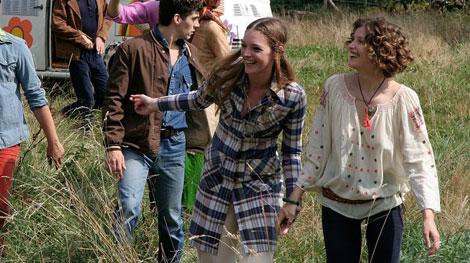Born in '68
18The sixties were a period of great change all around the world. France was no different. In 1968, the country saw its largest general strike, as well as the much publicised student protests in its capital. Born In ’68 captures the spirit of those times, and a whole lot more.
Catherine (Laetitia Casta) is a young and politically savvy woman, who is more than open to the idea of free love, as her two beaus Yves (Yannick Renier) and Hervé (Yann Trégouët) can testify to. Together they want to be a part of the change in the Parisian air, with the words ‘viva la revolution!’ ringing in their ears and hearts. So along with a small group of like-minded young folk, they head to the country where they create their very own commune.

I've heard that doing these M&S ads pays really well.
At first, the spirit of free love and peace is enjoyed by one and all. But as time passes, it’s soon clear that the commune way of life is not everyone’s cup of café au lait. As time moves on, attitudes change; technology progresses; and yet Catherine still manages to call the commune home. However, past lovers move on, as do her children, as their stories act as satellites to her own. But as political landscapes change, its repercussions touch all their lives.
Oliver Ducastel and Jaques Martineau appear to enjoy directing in each other’s company, as this is their third feature together. And at a running time close to three hours in length, it could be their most ambitious yet.
Although their leading mademoiselle Casta is probably better known for her supermodel credentials, she does a remarkable job taking on Catherine’s life through its many stages. She is the very heart of the film and gives the kind of performance that proves that she’s more than just a pretty face.
The real question has to be though, does the film’s story warrant its bladder-bulging 3 hour duration? Sadly, it doesn’t. You can sense that the directors were keen to tell a tale on a grand scale. However, with the first half of the film focusing on Catherine’s life, the second half attempts to condense her children’s stories – including their partners - into a cramped second half. Unfortunately, it’s difficult for audiences to really care about them, after most of the attention had been directed at their mother. And after the two and a half hour mark, you’re wishing death will come to them all, just so you can hit the exit and live what’s left of your own life.
What the film does manage to do, however, is authentically evoke periods in recent French history, enriched by its affects on a small band of studious individuals, and the way their lives and beliefs change with the social-political climate.
It doesn’t fail to impress with its ambition, but what ultimately lets it down is the scattered nature of its epic feeling storyline.
